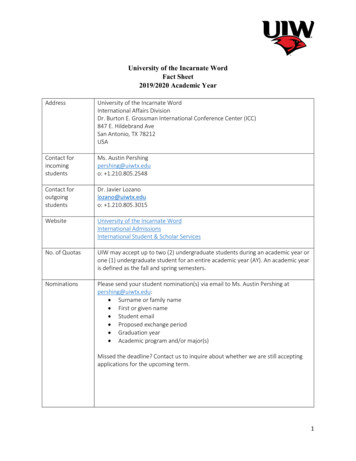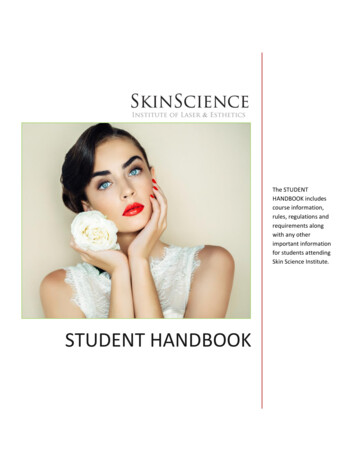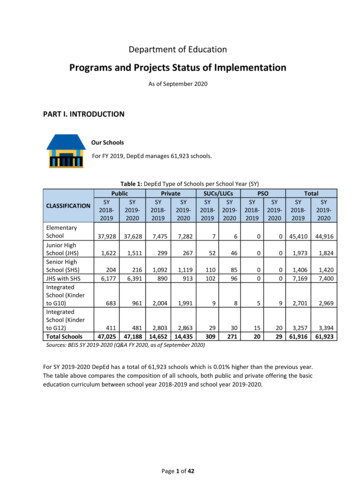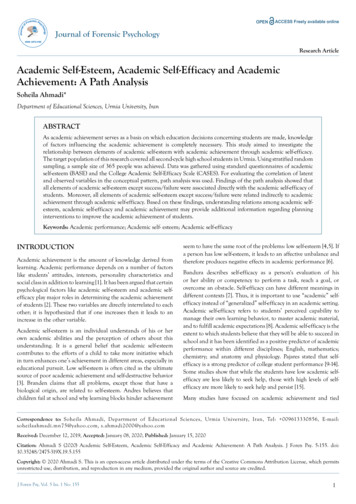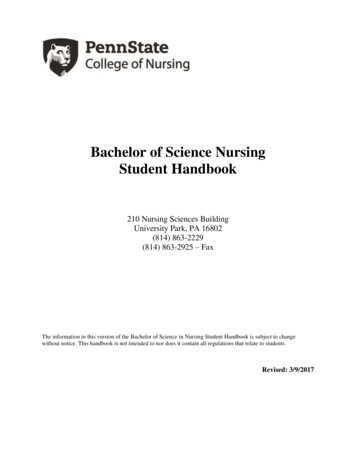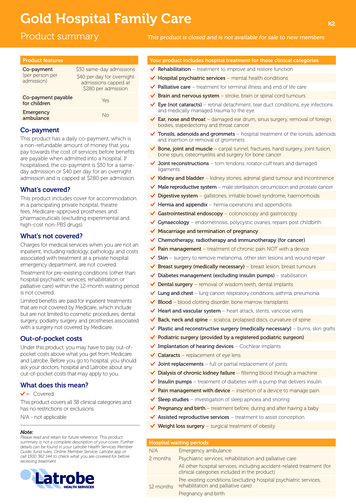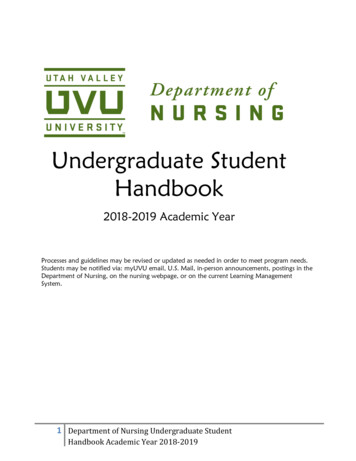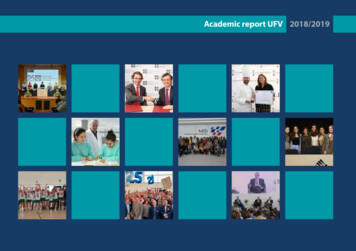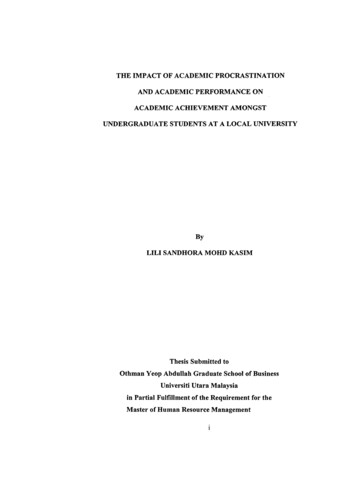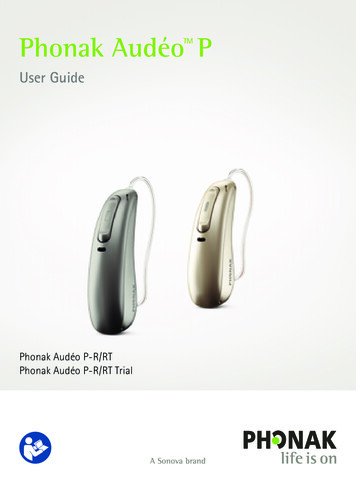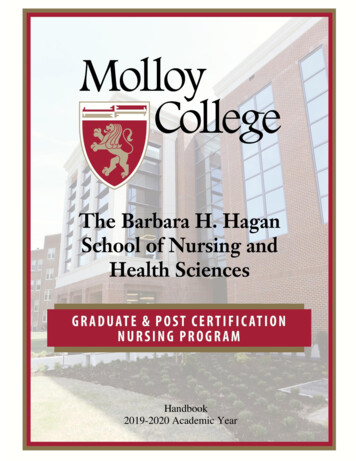
Transcription
Handbook2019-2020 Academic Year
Welcome to the Graduate Nursing ProgramDear Student,The information contained in this Graduate Nursing Program handbook has been developed to assistyou with your academic progression through the individual programs.This handbook will be your guide to the different phases and requirements of our program. Ofparticular importance are the procedures for submitting your medical documents and for all thepolicies regarding clinical placements. Students are held responsible for all information, policiesand procedures in the College Catalog, the Student Handbook and Calendar, and the GraduateNursing Handbook.All students are assigned a Molloy College email account with the ability to link to the “OnlineStudent and Faculty Access” through the website known as the “Lion’s Den”. Your Molloy emailis the official method of communication with faculty, advisors and the Barbara Hagan School ofNursing and Health Sciences. Therefore, it is very important to check email on a daily basis.Please do not hesitate to contact me at 516.323.3656 if you have any concerns. I look forward toworking with you throughout your studies and wish you every success in your academicendeavor.Joan Ginty, DNP, APRN, ANP-BCAssociate Dean for Advanced Nursing Practiceand DNP Programs
Heraldic History of the Armorial Seal of Molloy CollegeThe principal partition of the shield displays the blue and silver of the arms of Bavaria, Germany,from whence the Amityville Dominican Sisters immigrated to the United States in 1853.The black lion between three red trefoils are from the coat of arms of Archbishop Thomas E.Molloy for whom the College is named.The upper compartment of the shield displays the Dominican cross to indicate the heritage of theCollege.The crest is composed of a book, the symbol of learning, charged with the alpha and omega, thefirst and last letters of the Greek alphabet. The book is adorned with a Marian golden crown.Both the book and crown symbolize the Catholic tradition of the College.i
Mission StatementMOLLOY COLLEGEMolloy College, an independent, Catholic college, rooted in the Dominicantradition of study, spirituality, service and community is committed toacademic excellence with respect for each person. Through transformativeeducation, Molloy promotes a lifelong search for truth and the developmentof ethical leadership.ii
PrefaceThe Molloy College catalog offers general and academic information for all students at theCollege. The Molloy Graduate Student Handbook and Calendar provides a school calendar andgeneral information regarding policies, procedures and resources of the College. The BHSNHSGraduate and Post Graduate Student handbook provides information regarding programs,resources, policies, and requirements necessary for progressing through the Master’s and PostMaster’s programs. Students are held responsible for all information, policies and procedures inthe College Catalog, the Graduate Student Handbook and the BHSNHS Graduate and PostGraduate Student Handbook.iii
Table of ContentsI.THE SCHOOL OF NURSING AND HEALTH SCIENCESPageA. History of the School of Nursing . 1B. Location. 2C. Philosophy of the School of Nursing . 2D. Graduate Program Statement of Purpose . 3E. Characteristics of the Master's Graduate . 3F. Humanistic Nursing Framework. 4G. Code for Nurses . 7H. Master's Degree Program Descriptions . 8I. Programs and Courses of Study. 9J. Sample Schedules . 10II.ACADEMIC AFFAIRSA. Admission . 26B. Progression . 26C. Graduate Assistant's Program. 27D. Academic Regulations . 27E. Academic Standards . 29F. Academic Integrity . 30G. Academic Review Process . 31H. Exit Interview. 31I. Graduation Requirements . 32J. Americans with Disabilities . 32K. Honors . 32III.BHSNHS POLICIESA. Hierarchy of Communication for Academic Problems . 33B. Network for Assistance with Personal Problems . 33C. Pre-Clinical Requirements . 34D. Drug Screening Policy . 36E. Clinical/Practicum Policies . 37F. APA Format . 38G. Critical Thinking . 38H. Plagiarism . 39I. Student Clinical/Practicum Injury . 39J. Non-Discrimination in Nursing Practice . 39K. Strike Policy . 39L. Infectious Disease Policy . 40M. Social Media Use. 41IV.PROFESSIONAL ORGANIZATIONSA. American Nurses Association . 45B. National League for Nursing . 45C. American Association of Colleges of Nursing . 45D. Sigma Theta Tau . 45iv
V.COMMITTEES WITHGRADUATE STUDENT REPRESENTATIVESA.B.C.D.E.F.VI.Process for Student Election to Committee . 46Graduate Academic Programs and Policies . 46Community and Campus Life . 46Financial Resources . 47Priorities and Planning . 47Graduate Nursing Committee, BHSNHS . 47AIDS TO LEARNING AND RESEARCHA.B.C.D.E.F.VII.PageAdvisement50Nursing Labs and Resource Center . 50Libraries . 50Media Center . 50Academic Resource Center . 50Alumni Lifetime Scholarships . 51COLLEGE POLICIESSee current Molloy College Student Planner/Handbook(Access through Molloy College Web Page (www.molloy.edu) andMolloy College CatalogVIII.POST-MASTER'S ADVANCED CERTIFICATE PROGRAMSA. Purpose and Overview . 53B. Nursing Education, Nursing Administration, Nursing Administration withInformatics, Clinical Nurse Specialist, Nursing Informatics . 53C. Nurse Practitioner . 56D. Course of Study. .59APPENDICESA.B.C.D.E.F.G.H.I.Clinical/Preceptor Placement InformationSample EvaluationsNP Clinical Skills and Procedures ChecklistGuideline for Clinical Evaluation ToolNP Clinical Competency ToolClinical Hours LogsInitial and Yearly Physical Form/HIPAA WaiverBasic Physical Assessment Competency InformationAcademic Review Formv
I. THE BARBARA H. HAGAN SCHOOL OF NURSING AND HEALTH SCIENCESA. History of Molloy CollegeMolloy Catholic College for Women was established in 1955 by the Sisters of St. Dominic of Amityvilleunder a provisional charter of the University of the State of New York. This was accomplished with theguidance of the Most Reverend Thomas E. Molloy, Archbishop of Brooklyn. The absolute charter wasgranted in 1960 with the power to confer the degrees of Bachelor of Arts and Bachelor of Science.A major in Nursing was introduced in the college in September 1955 with first capping ceremony in 1958.The Nursing Program received accreditation by the National League for Nursing (NLN) May 1969.In 1971, the name of the college was officially changed to Molloy College. In 1972, through a CharterAmendment, men were permitted matriculation in the Nursing Program and Evening Division. By a voteof the Board of Trustees in 1982, men were admitted to all Molloy College programs. Molloy College isaccredited by the Board of Regents of the University of the State of New York, and the Middle StatesAssociation of Colleges and Schools. At present, Molloy College awards degrees in more than 30 areas ofconcentration.The Nursing Program has grown in size and stature over the years and at present, has the largest number ofmajors on the college campus. The Degree Completion Program for Registered Nurses was implementedin the fall of 1971. In 1988, the college welcomed its first Graduate Students who enrolled in the programleading to a Master of Science Degree in Nursing. Post-Master’s Certificate Programs and the DualDegree Program for Registered Nurses and Second Degree students were implemented in 1994. TheNurse Practitioner Programs were initiated in 1995.The last NLN site visit was in October 1992 and the programs (Graduate and Undergraduate Programs)received full accreditation. In 1998 both programs was granted full ten year accreditation by theCommission on Collegiate Nursing Education (CCNE). In January 2004, the interim report to CCNE wasaccepted. After the most recent reaccreditation cycle in fall 2018, the nursing programs (BS, MS, DNPand Advanced Certificate) continue to be fully accredited by the CCNE.In July 2006, the department became a Division within the College.The Molloy College Nursing Program has an excellent reputation in the professional Nursing communityin the New York Metropolitan area & since its inception, there have been thousands of nursing graduatesfrom the Undergraduate Program.In September 2010, the first doctoral students were accepted. The second doctoral program, Doctor ofNursing Practice (DNP) began in September 2014. The Division moved into The Barbara H. Hagan Centerfor Nursing on January 19, 2016 and in April of that year officially changed its name to The Barbara H.Hagan School of Nursing. The dedication ceremony was held on the lawn in front of the building on April19th with community leaders, religious leaders, faculty, students and college leadership in attendance. Thisauspicious school year ended with a graduation ceremony with 10 PhD students being hooded by facultyand the president. In September 2019, as the school expanded to include the departments ofCommunication Sciences and Disorders and Allied Health Sciences, it was renamed The Barbara H.Hagan School of Nursing and Health Sciences.Rev 8/20/19
B.LocationThe nursing program faculty offices, laboratories and classrooms are located in The Barbara H.Hagan Center for Nursing.C.The Philosophy of the BHSNHSThe faculty of the BHSNHS, in accord with Molloy College, believes that every person as abiological, psychological, sociological, spiritual, cultural being has an innate potential for selfactualization in a dynamic universe. We believe that human beings are entitled to an environmentwhich fosters individual self-esteem and mutual positive regard. We hold in high esteem theinherent worth and dignity of all individuals. It is the concept of valuing, in relation to humanityenvironment-health, which gives meaning to humanistic nursing practice.Each human being is an integrated whole evolving through time. The uniqueness of humanity isreflected through individuals, families, and communities continuously interacting with theirenvironment. Since environment influences the health and well-being of humanity, we recognizeour collective responsibility to strive toward an environmentally better world.Health is a dynamic state of bio-psycho-socio-spiritual-cultural well-being. A responsible societyprovides a health care system that enables individuals to function at their highest level. Nursingmeets the actual and potential needs of humanity by assisting a diverse, multi-cultural populationto attain, maintain, and retain optimum health.Nursing is both a science and an art, which focuses on the diagnosis and treatment of humanresponses. Humanistic nursing integrates theory and practice within a framework of ethicaldecision-making. Nursing provides health care for individuals, families, and communities.Central to professional practice are caring, interpersonal communication, and nursing therapeutics.We believe that nursing is a social contract grounded in the professions code of ethics and requiresa life-long professional commitment.Baccalaureate nursing education is based on liberal arts and sciences. This foundationdistinguishes baccalaureate nurses by preparing them to communicate, evaluate, and providehumanistic health care. Professional nursing education includes nursing's scientific body ofknowledge, which is augmented by the findings of multidisciplinary research. Baccalaureateeducation prepares the nurse generalist in a beginning leadership role as a member of aninterdisciplinary health care team who is able to practice in a variety of settings.The faculty believes that learning is an ongoing process that fosters intellectual inquisitiveness,critical thinking and decision-making, a creative approach to life situations, and an appreciation ofethical and aesthetic values. We believe learning occurs best in a humanistic environment thatvalues students and supports them in becoming increasingly self-aware and self-directed.2
A Master of Science degree builds on a foundation of baccalaureate nursing education andintegrates nursing theory, research, and knowledge from other disciplines. Students, throughscholarly activities, acquire the necessary knowledge, understanding, and values that lay thegroundwork for advanced humanistic nursing practice. It is the integration of theory and practice,grounded in ethical decision-making that distinguishes humanistic practice. Graduate educationassists students to perceive new relationships among variables that affect professional nursing inan evolving health care system.The faculty believes that graduate education provides an opportunity for professional nurses todevelop advanced competencies in nursing therapeutics, in areas of clinical concentration and rolefunction, congruent with an expanding theoretical knowledge and authority base. Master'seducation prepares nurses to manage care in complex situations and meet intensified health caredemands. The faculty recognizes the importance of collaboration among health care professionalsand the uniqueness of nursing's contribution.(Updated 6/2007)D.Graduate Program Statement of PurposeThe purpose of the Graduate Program in Nursing at Molloy College is to prepare nurses as leadersfor advanced roles within an increasingly complex health care environment. The program isdesigned to foster personal and professional growth, translate advanced knowledge into practice,and provide a foundation for doctoral study. Through the Humanistic Nursing Framework, thegraduate program reflects the uniqueness of Molloy's Judeo-Christian traditions, contributing tothe goal of educating nurses for excellence in caring, scholarship and collaboration.E.Characteristics of the Molloy College Master's Prepared NurseThe graduate of the Master of Science Program of Molloy College is professionally educated foradvanced nursing practice and has acquired a foundation for doctoral study. The Master'sgraduate:1.Demonstrates a belief in the inherent worth and dignity of all individuals through rolemodeling professional nursing.2.Demonstrates advanced competencies and ethical decision-making.3.Assumes responsibility and accountability for advanced professional practice inan increasing complex health care environment.4.Assumes a leadership role based on theory, research and expert practice.5.Designs and implements research.6.Advocates for an environment of health in a global society.(Approved by Graduate Program Faculty and Division of Nursing Faculty 5/14/08)3
F.Humanistic Nursing e Molloy Humanistic Nursing Framework affirms nursing’s human foundations andis primarily concerned with human beings, their values, beliefs, perceptions, capacitiesand achievements. The humanistic framework addresses nursing as its central concept.Integral to Nursing are Humanity, Environment, Health, and Valuing. Nursing interactswith each of these four concepts as they, in turn, interact with each other. Theseconcepts are addressed throughout the program.The sub-concepts of Nursing are knowledge, responsibility and accountability,leadership/management, research, and professional role. These sub-concepts areintroduced at Level I and are further developed within each subsequent level.4
Definitions of the Concepts and Sub-Concepts of the Humanistic Nursing FrameworkConceptsDefinitionsHUMANITYA unique human being, functioning as an integrated whole, reflectingbio-psycho-socio- spiritual-cultural dimensions.ENVIRONMENTThe sum total of all internal and external dimensions that influencehuman beings.HEALTHA dynamic state of bio-psycho-socio-spiritual-cultural well-being.VALUINGTo hold in high esteem, the inherent worth and dignity of allindividuals.NURSINGA science and an art which focuses on the diagnosis and treatment ofhuman responses.Sub-ConceptsDefinitionsKNOWLEDGENursing knowledge is based on the liberal arts and sciences andincorporates humanity/environment sional nurses accept responsibility and are therefore heldaccountable to maintain Standards of Practice and adhere to theProfession's Code of Ethics.LEADERSHIP/MANAGEMENTWorking collaboratively with individuals and groups to accomplishprofessional goals.RESEARCHA process of inquiry that provides evidence contributing to nursing'sexpanding body of knowledge.PROFESSIONALROLEProvides humanistic health care to promote health and manage illnessfor individuals, families and communities in accordance withstandards of nursing practice.Critical thinking: the rational examination of ideas, inferences, assumptions, values, beliefs, and actions.Reference: Bandman, E.L. & Bandman, B. (1988). Critical thinking in nursing Connecticut: Appleton &Lange, p 5.5
ModelsConducts mes(AdvancedPractice)DesignsUtilizes(Advanced)BS UtilizesPractices(Generalist)Level vel stratesDiscussesDemonstrates(BeginningLevel)Level The Molloy College BHSNHS Humanistic Framework, Extended to the Doctoral Level
G. Code for NursesThe master’s program in nursing at Molloy College is guided by the Code for Nurses of theAmerican Nurses’ Association (1950 and revised in 2001). All graduate nursing students areexpected to adhere to these guidelines.INTRODUCTIONA code of ethics indicates a profession’s acceptance of the responsibility and trust with which ithas been invested by society. The code of ethics offers general principles to guide and evaluatenursing actions. It serves to inform both the nurse and society of the profession’s expectationsand requirements in ethical matters.The following is a list of ethical statements. A further explanation in the form of interpretativestatements is available from the American Nurses’ Association.STATEMENTS1. The nurse, in all professional relationships, practices with compassion and respect for theinherent dignity, worth and uniqueness of every individual, unrestricted by considerationsof social or economic status, personal attributes, or the nature of the health problems.2. The nurse’s primary commitment is to the patient, whether an individual, family, group orcommunity.3. The nurse promotes, advocates for, and strives to protect the health, safety, and rights ofthe patient.4. The nurse is responsible and accountable for individual nursing practice and determinesthe appropriate delegation of tasks consistent with the nurse’s obligation to provideoptimum patient care.5. The nurse owes the same duties to self as to others, including the responsibility to preserveintegrity and safety, to maintain competence, and to continue personal and professionalgrowth.6. The nurse participates in establishing, maintaining and improving healthcare environmentsand conditions of employment conducive to the provision of quality healthcare andconsistent with the values of the profession through individual and collective action.7. The nurse participates in the advancement of the profession through contributions topractice, education, administration and knowledge development.8. The nurse collaborates with other health professional and the public promotingcommunity, national and international efforts to meet health needs.9. The profession of nursing, as represented by associations and their members, isresponsible for articulating nursing values, maintaining the integrity of the profession andshaping social policy.7
H. Master's Degree Program in NursingThe mission of graduate study is to provide the opportunity for the attainment of advancedtheoretical knowledge and its application in a selected area of nursing practice. The MolloyCollege program combines academic, clinical and research activities which enable thestudent to develop the knowledge and skills necessary to practice at a high level of expertise, adistinguishing feature of graduate education.There are nine programs in the Masters of Science Degree Program (MS) in Nursing. Students choosefrom clinical concentrations in the areas of: Adult-Gerontology Primary Care Nurse Practitioner Adult-Gerontology Acute Care Nurse Practitioner Pediatric Nurse Practitioner-Primary Care Family Nurse Practitioner-Primary Care Family Psychiatric Mental Health Nurse Practitioner Nursing Education Nursing Administration with Informatics Clinical Nurse Specialist: Adult-Gerontology Health Dual Degree MS Nursing Admin with Informatics/MBA Healthcare ManagementThe minimum number of credits required for graduation is 42 in the clinical nurse specialistprogram, 45-48 in the nurse practitioner programs and 42-46 in the remaining programs.It is the accepted practice at Molloy College that faculty take attendance in all courses.- Students should notify faculty of an absence if necessary as the result of a serious situation.- Failure to attend class for two (2) consecutive weeks at any point in the semester, without notification ofextenuating circumstances, will result in an administrative withdrawal from the course.- Administrative withdrawal results in removal from the course with a grade of "WA" or "WF" determinedby the point in the term and the academic performance.- Students should consult the College catalog for complete details regarding withdrawals and the potentialfinancial implications of a withdrawal.The core courses, germane to the philosophy of the program, provide the foundation for theHumanistic Professional Nursing curriculum.These courses consist of 12 credits and arerequired for all masters’ students.Research is a critical seven credit component for theprogram and is required of all masters’ students.These courses provide the link betweentheory, education and practice, as well as the knowledge and skills necessary for computerassisted research.The nurse practitioner programs are designed to prepare advanced practice nurses in the primary care ofthe adult, pediatric or family client. The curriculum assists students in the development of the skillsnecessary to foster high levels of client health through the practice of promotion, prevention and self- care.Educational experiences include the assessment of physical and mental health conditions, diagnosis ofillnesses and the performance of therapeutic and corrective measures.Nurse practitioner students fulfill their clinical concentration with 15-18 specialty area credits in either theadult, pediatric, family or psychiatry fields, and their nurse practitioner role function includes 11 credits ofAdvanced Practice Core.The Nursing Education, Nursing Administration with Informatics, and Clinical Nurse Specialist programsprovide concentrated study for development in each professional area.Note. The BHSNHS reserves the right to make necessary program alterations in response to changes inprofessional nursing practice and/or the health-care delivery system. Students are responsible for meetingprogram requirements and adhering to pre and co-requisites.8Revised 8/15/19
I.Program and Course of StudyThe Master's Program entitled Humanistic Nursing Practice in an Evolving Health Care System has eightprograms which include: Nursing Education, Nursing Administration with Informatics, Clinical NurseSpecialist Adult-Gerontology Health, Adult-Gerontology Primary Care Nurse Practitioner, Pediatric NursePractitioner-Primary Care, Family Nurse Practitioner-Primary Care and Family Psychiatric Mental HealthNurse Practitioner. The Adult, Pediatric, Family and Psychiatry Nurse Practitioner programs and theNursing Education, and Clinical Nurse Specialist Programs are each comprised of four component groups:the core, the research core, and the advanced practice core and specialty area.The Nursing Administrationwith Informatics program is comprised of three component groups: the core, research and specialtyarea.The following course of study illustrates the sequencing of courses, credit allocation, and courseorganization so that knowledge and skills are developed progressively throughout the program. Corecourses and the research component are required for all Master's Degree candidates. The content of thesecourses is designed to provide knowledge believed to be essential to all Molloy Master's Degree inNursing students. Core courses and research requirements are as follows:CORE (12 credits)ETH 5050Advanced Medical Ethics3 creditsNUR 5050Advanced Nursing Theory3 creditsNUR 5100Current Issues in Professional Nursing3 creditsNUR 5150Organizational Theory3 creditsCore courses form the foundation of graduate nursing study. These courses must be completedbefore moving into the Advanced Practice Core specialty practice courses.RESEARCH CORE (7-10 credits)MAT 5500NUR 5550Statistical Analysis with Computers3 creditsResearch Method and Design4 credits(An undergraduate statistics course is a prerequisite to MAT 5500)(An undergraduate research course and MAT 5500 are prerequisite to NUR 5550)Students, who have taken basic statistics more than 5 years before entering the program, arerequired to take a basic statistics review course offered by Molloy College Continuing Education andProfessional Development or its equivalent. Exceptions may be made by the Associate Dean andDirector of the Graduate Nursing Program.THESIS OPTION- Students choosing the thesis option take:NUR 5600Thesis Advisement (Optional)This course is designed for students who elect to initiate a research proposal culminating in aMaster’s Thesis that is the intellectual product of NUR 5610. Thesis advisement provides facultyguidance during the proposal implementation and preparation of the thesis. The student has theop
of the Board of Trustees in 1982, men were admitted to all Molloy College programs. Molloy College is accredited by the Board of Regents of the University of the State of New York, and the Middle States Association of Colleges and Schools. At present, Molloy College awards degrees in more than 30 areas of concentration. The Nursing Program has .
